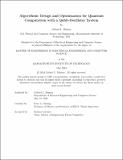Algorithmic Design and Optimization for Quantum Computation with a Qubit-Oscillator System
Author(s)
Mintzer, Gabriel L.
DownloadThesis PDF (11.91Mb)
Advisor
Chuang, Isaac L.
Terms of use
Metadata
Show full item recordAbstract
Quantum computation has long been dominated by a digital approach using the qubit, which exists in a two-dimensional vector space, as its basic unit. More recently, there has been increasing interest in an analog approach, which uses as its basic unit a qudit in an infinite-dimensional vector space. Alongside these two approaches is a third less-studied approach, that of combining digital and analog quantum computation. This approach is perhaps best exemplified by, and most researched via, the system of a qubit coupled to a quantum harmonic oscillator, which has been realized with many of the leading platforms for quantum computation. In this thesis, we ask how machine learning and other high-level computational techniques can be employed in the design of applications of a qubit-oscillator system to implementing fundamental components of quantum technology. In order to begin to answer this question and lay the groundwork for future investigation, both with this system and with others, we demonstrate the application of such high-level computational techniques toward addressing the problems of quantum compilation, quantum sensing, and quantum error-correction with the qubit-oscillator system.
Date issued
2024-05Department
Massachusetts Institute of Technology. Department of Electrical Engineering and Computer SciencePublisher
Massachusetts Institute of Technology